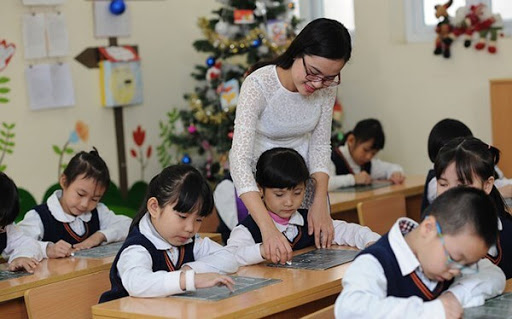In September, several important policies in the education sector of Vietnam will come into effect such as regulations on teachers’ summer break; standard teaching norms; assessment and grading of Learning Units;... The specific content of these policies is as follows:

Vietnam: Important policies on education effective from September 2020 (Illustration)
1. General education teachers in Vietnam are entitled to an 08-week summer break
According to Article 3 of Decree 84/2020/ND-CP on the summer break for teachers in Vietnam:
- Annual summer break of teachers of institutions for preschool education, institutions for general education, and special schools is 8 weeks, including annual permitted leave;
- Annual summer break of teachers of vocational secondary schools and colleges is 6 weeks, including annual permitted leave;
- Annual summer break of teachers of institutions of higher education shall comply with organizational and operational regulations of the institutions of higher education;
- In case of any irregularity, emergency cases for prevention of natural disasters, diseases or other emergencies, summer break of teachers of institutions for preschool education, institutions for general education, special schools, vocational secondary schools and colleges shall be decided by Minister of Education and Training and Minister of Labor – War Invalids and Social Affairs depending on entitlement.
2. Lecturers in Vietnam must ensure a minimum of 100 face-to-face teaching hours per academic year
Under Clause 4 Article 3 of Circular 20/2020/TT-BGDDT, the standard teaching hours for a lecturer in an academic year are regulated to be from 200 to 350 standard teaching hours (equivalent to 600 to 1,050 administrative hours).
The number of face-to-face teaching hours (or online teaching) must ensure at least 50% of the stipulated norm.
The heads of higher education institutions, based on the institution's objectives, development strategies, the specifics of subjects, courses, and their particular conditions, shall determine the appropriate standard teaching hours for lecturers within an academic year.
Thus, the minimum face-to-face teaching hours for lecturers in an academic year must ensure at least 100 hours/year.
The standard teaching hours in special cases are determined as follows:
- Lecturers during the probationary period only perform up to 50% of the standard teaching hours and are exempted from scientific research tasks to attend classes of experienced lectures, assist in teaching, and participate in internships and practical experiences.
- Lecturers taking leave covered social insurance benefits or leave under the current Labor Code are exempted from the standard teaching hours corresponding to the period of leave.
3. There are additional 06 new administrative procedures in the education and training sector in Vietnam
According to Decision 2284/QD-BGDDT of the Ministry of Education and Training of Vietnam issued on August 10, 2020, the following 06 new administrative procedures have been added in the education and training sector:
- Central administrative procedures:
+ Transforming private preschools established by foreign diplomatic missions, and intergovernmental international organizations to non-profit private preschool educational institutions;
+ Transforming private general education institutions established by foreign diplomatic missions, and intergovernmental international organizations to non-profit private general education institutions.
- Provincial administrative procedures:
+ Transforming private nursery schools, kindergartens, and preschools invested by foreign investors to non-profit private nursery schools, kindergartens, and preschools;
+ Transforming private upper secondary schools, private general education institutions with multiple levels of education, where the highest level is high school, invested by domestic investors; private general education institutions invested by foreign investors to non-profit private general education institutions.
- District administrative procedures:
+ Transforming private nursery schools, kindergartens, and preschools invested by domestic investors to non-profit private nursery schools, kindergartens, and preschools;
+ Transforming private primary schools, private lower secondary schools, and private general education institutions with multiple levels of education where the highest level is a lower secondary school, invested by domestic investors to non-profit private general education institutions.
4. There are regulations on assessment and grading of Learning Units
The assessment and grading of Learning Units must be based on the results achieved in the criteria specified in Article 5 of Circular 22/2020/TT-BGDDT.
The assessment and grading of Learning Units are based on a scoring method. The maximum total score for all criteria is 100.
The evaluation and classification are determined as follows:
- Good: Total score from 85 to 100 points;
- Fair: Total score from 70 to below 85 points;
- Average: Total score from 50 to below 70 points;
- Unqualified: The remaining cases.
These are the important new policies on education that will be effective from September 2020. We hope this information is necessary and helpful for the work of our Valued Customers and Members.
Thuy Tram
 Article table of contents
Article table of contents










.Medium.png)
.Medium.png)
.Medium.png)
.Medium.png)
